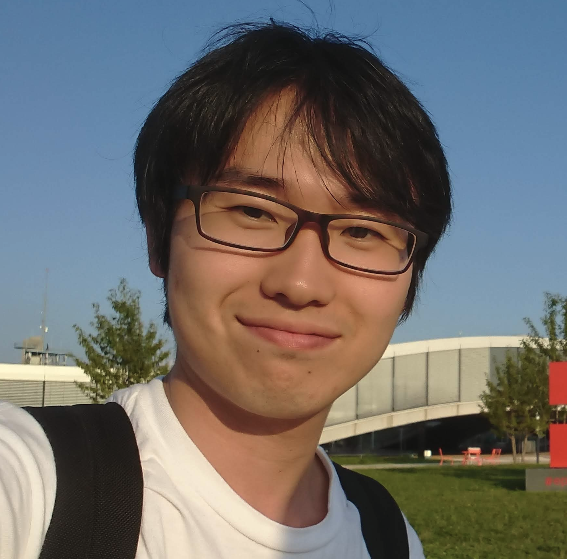Luis Sentis (Sat 23 Nov, 11:30-12:00)
The Point of Humanoid Robots
Kento Kawaharazuka (Sat 23 Nov, 12:00-12:30)

History and Future of Tendon-driven Musculoskeletal Humanoids
At JSK Robotics Laboratory, we have developed various humanoids, such as those for daily life support and disaster rescue, musculoskeletal humanoids that mimic the human body, and flying humanoids. In this keynote talk, I will focus on tendon-driven musculoskeletal humanoids and introduce the series of humanoids we have developed, such as Kenta, Kotaro, Kojiro, Kenzoh, Kenshiro, Kengoro, and Musashi. Additionally, I will present the Kangaroo robot, the jumping monopedal robot RAMIEL, the light-weight flexible manipulator SAQIEL, and the mobile tendon-driven robot Cubix, all of which utilize the advantages of tendon-driven mechanisms. Tendon-driven mechanisms are currently being incorporated into hands, manipulators, and leg systems to achieve quick, flexible, and delicate movements, and they are gaining popularity. I hope you will fully immerse yourself in their appeal.
Biography: Kento Kawaharazuka is a Project Assistant Professor of JSK Robotics Laboratory in the Department of Mechano-Informatics at the University of Tokyo, Japan. He received his B.E., M.S., and Ph.D. degrees in Mechano-Informatics from the University of Tokyo in 2017, 2019, and 2022, respectively. He was a Best Paper Award Finalist at Humanoids 2016 and 2022, and received the Best Oral Paper Award at Humanoids 2020. His research interests include musculoskeletal humanoids that closely mimic human anatomy, wire-driven robots, soft robotics, machine learning-based controls such as imitation learning, reinforcement learning, and predictive model learning, and real-world robot applications of foundation models including large language models and vision-language models. – https://haraduka.github.io/
Michael Yu Wang (Sat 23 Nov, 16:00-16:30)
Rapid Rise of Humanoid Robots in China
At the World Robot Conference in August 2024 in Beijing, China, 27 humanoid robots were showcased, which are the most ever. They highlighted the rapid progress in this field and showed how they’re setting new standards with potentials to interrupt and impact our work and lives. The advancement in machine learning and artificial intelligence is a major driver of the rapid rise of humanoid robots in China, as the developers are expecting a boom market for their future roles in industry, healthcare, education, and household assistance.
This talk will present an overview of China’s current status in humanoid robots based on personal experience and academic collaborations. I will discuss the goals and plans of the government, the innovation strategy for global leadership, and the partnership between local governments, industry leaders, and research institutions, aiming to set China up to be a leader in the world of humanoid robotics. Still, China’s humanoid robot industry is facing several challenges, including technological hurdles in perfecting AI and ensuring that these robots can effectively and safely work in real-world environments. International collaboration and open-source development are also crucial for driving innovation to make significant strides in this field for global benefits of humanity.
Biography:
Michael Yu Wang is a Chair Professor and the Founding Dean of the School of Engineering of the Great Bay University, China. He has served on the engineering faculty at University of Maryland, Chinese University of Hong Kong, National University of Singapore, Hong Kong University of Science and Technology, and Monash University. He has numerous professional honors–Kayamori Best Paper Award of 2001 IEEE International Conference on Robotics and Automation, the Compliant Mechanisms Award-Theory of ASME 31st Mechanisms and Robotics Conference in 2007, Research Excellence Award (2008) of CUHK, and ASME Design Automation Award (2013). He was the Editor-in-Chief of IEEE Trans. on Automation Science and Engineering, and served as an Associate Editor of IEEE Trans. on Robotics and Automation and ASME Journal of Manufacturing Science and Engineering. He is a Fellow of ASME, HKIE and IEEE. He received his Ph.D. degree from Carnegie Mellon University. — www.gbu.edu.cn
Jan Peters (Sun 24 Nov, 11:30-12:00)
Inductive Biases for Learning of Anthropomorphic Robots
Autonomous humanoid robots that can assist humans in situations of daily life have been a long-standing vision of robotics, artificial intelligence, and cognitive science. A first step towards this goal is to create robots that can learn tasks triggered by environmental context or higher-level instruction. However, learning techniques have yet to live up to this promise as only few methods manage to scale to high-dimensional manipulator or humanoid robots. In this talk, we investigate a general framework suitable for learning motor skills in robotics which is based on the principles behind many analytical robotics approaches. To accomplish robot reinforcement learning from just a few trials, the learning system can no longer explore all learnable solutions but has to prioritize one solution over others – independent of the observed data. Such prioritization requires explicit or implicit assumptions, often called ‘induction biases’ in machine learning. Extrapolation to new robot learning tasks requires induction biases deeply rooted in general principles and domain knowledge from robotics, physics and control. Empirical evaluations on several robot systems illustrate the effectiveness and applicability to learning control on an anthropomorphic robot arm. These robot motor skills range from toy examples (e.g., paddling a ball, ball-in-a-cup) to playing robot table tennis, juggling and manipulation of various objects.
Biography: Jan Peters is a full professor (W3) for Intelligent Autonomous Systems at the Computer Science Department of the Technische Universität Darmstadt since 2011, and, at the same time, he is the dept head of the research department on Systems AI for Robot Learning (SAIROL) at the German Research Center for Artificial Intelligence (Deutsches Forschungszentrum für Künstliche Intelligenz, DFKI) since 2022. He is also is a founding research faculty member of the Hessian Center for Artificial Intelligence. Jan Peters has received the Dick Volz Best 2007 US PhD Thesis Runner-Up Award, the Robotics: Science & Systems – Early Career Spotlight, the INNS Young Investigator Award, and the IEEE Robotics & Automation Society’s Early Career Award as well as numerous best paper awards. In 2015, he received an ERC Starting Grant and in 2019, he was appointed IEEE Fellow, in 2020 ELLIS fellow and in 2021 AAIA fellow. Despite being a faculty member at TU Darmstadt only since 2011, Jan Peters has already nurtured a series of outstanding young researchers into successful careers. These include new faculty members at leading universities in the USA, Japan, Germany, Finland and Holland, postdoctoral scholars at top computer science departments (including MIT, CMU, and Berkeley) and young leaders at top AI companies (including Amazon, Boston Dynamics, Google and Facebook/Meta). Jan Peters has studied Computer Science, Electrical, Mechanical and Control Engineering at TU Munich and FernUni Hagen in Germany, at the National University of Singapore (NUS) and the University of Southern California (USC). He has received four Master’s degrees in these disciplines as well as a Computer Science PhD from USC. Jan Peters has performed research in Germany at DLR, TU Munich and the Max Planck Institutes for Biological Cybernetics and for Intelligent Systems (in addition to the institutions above), in Japan at the Advanced Telecommunication Research Center (ATR), at USC and at both NUS and Siemens Advanced Engineering in Singapore. He has led research groups on Machine Learning for Robotics at the Max Planck Institutes for Biological Cybernetics (2007-2010) and Intelligent Systems (2010-2021). – https://www.ias.informatik.tu-darmstadt.de/
Justin Carpentier (Sun 24 Nov, 12:00-12:30)
Towards Fully Differentiable Control Architecture for Robotics: Simpler, Nimbler, Faster, Stronger
Over the past decades, optimization has emerged as a key enabler for many robotics applications, particularly humanoids and quadrupeds. While initial solutions largely relied on models, in today’s data-driven landscape, it is becoming increasingly common to seek data-driven extensions to classical approaches. Differentiable control architectures propose a principled way to achieve this evolution. In this keynote, I will highlight recent contributions from our group towards this objective, notably our efforts to (i) lay the groundwork for the next generation of differentiable simulators for robotics and (ii) develop differentiable optimization solvers that are both fast and dependable. Hopefully, these contributions will catalyze the design of the next generation of data-driven planning and control methods for robotics.
Biography: Justin Carpentier is a researcher at Inria and École Normale Supérieure, heading the Willow research team since 2023. He graduated from École Normale Supérieure Paris-Saclay in 2014 and received a Ph.D. in Robotics in 2017 from the University of Toulouse. He did his Ph.D. in the Gepetto team at LAAS-CNRS in Toulouse, working on the computational foundations of legged locomotion. In 2024, he received an ERC Starting Grant focusing on laying the algorithmic and computational foundations of Artificial Motion Intelligence. His research interests lie at the interface of optimization, machine learning, computer vision, simulation, and control for robotics, with applications ranging from agile locomotion to dexterous manipulation. He is also the leading developer and manager of widely used open-source robotics software, among them Pinocchio, ProxSuite, HPP-FCL, and Aligator. – https://jcarpent.github.io/
Agnieszka Wykowska (Sun 24 Nov, 16:00-16:30)
The role of humanoid robots in cognitive neuroscience
Humanoid robots have recently received a lot of attention and enthusiasm in the robotics community and beyond. Indeed, with new technological advancements, they hold the promise to become our assistants in daily lives, as general-purpose machines. In this talk, however, I will focus on a different, less explored, way of using humanoids – as tools to understand human cognition. Humanoids can play a substantial role in the scientific understanding of human cognition, both through the construction of embodied models of cognitive mechanisms, and in the role of sophisticated apparatus in experimental paradigms. In this talk, I will present the work of our lab where we have examined how fundamental mechanisms of human cognition, such as attention, decision making or sense of agency, are modulated by the interaction with a humanoid. I will then demonstrate how results from such studies can be used in robot-assisted cognitive training for children with disabilities, highlighting the role of fundamental science in applied research and technology transfer.
Biography: Agnieszka Wykowska is the head of the unit “Social Cognition in Human-Robot Interaction” at the Italian Institute of Technology (IIT), in Genoa, Italy. She is also the Coordinator of the Center for Human Technologies, at the IIT. Her background is Cognitive Neuroscience (Master’s degree in Neuro-Cognitive Psychology from the Ludwig Maximilian University Munich in 2006). She obtained a PhD in Psychology (2008) from the same university. In 2016 she was awarded the ERC Starting grant “InStance: Intentional Stance for Social Attunement”. Between 2022 and 2024 she served in the role of President of the European Society for Cognitive and Affective Neuroscience (ESCAN). She is Editor-in-Chief of International Journal of Social Robotics. She is also board member of Association of ERC Grantees and a delegate to the European Research Area (ERA) Forum – an EU expert group shaping EU science policies. In 2023 she was awarded the Hans-Fischer Senior Fellowship from the Institute of Advanced Studies at the Technical University Munich to lead a research group “Human Cognition in Neuroengineering”. – https://www.iit.it/it/people/agnieszka-wykowska





